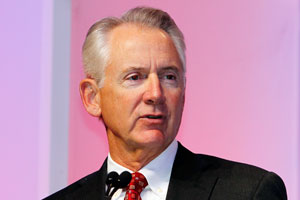Senior Reporter
ATA President Graves: Highway Bill’s CSA Reforms Address Trucking’s Concerns

PHILADELPHIA — Provisions that would reform a federal scoring program for truck companies in a recently unveiled highway bill would address concerns the trucking industry has raised for years, American Trucking Associations President Bill Graves said.
Graves, in his annual State of the Industry address, urged House lawmakers to advance the six-year highway bill that would require a study of the Federal Motor Carrier Safety Administration’s Compliance, Safety, Accountability program. The legislation would require FMCSA to present Congress with a plan for reforming CSA. Upon the bill’s enactment into law, certain CSA data would no longer be made public until DOT’s inspector general conducted an extensive review of the CSA program.
“If we can get Congress to move on a highway bill, we’ve got language in the just-released chairman’s markup that addresses some of our CSA concerns,” Graves told executives Oct. 18 at ATA’s Management Conference & Exhibition here.
RELATED STORY: Graves, Burch recall the late Dan Case
The House Transportation and Infrastructure Committee is scheduled to take up the highway reauthorizing legislation Oct. 22. That committee’s chairman, Bill Shuster (R-Pa.), who will deliver keynote remarks here Oct. 19, intends to advance the six-year highway bill to the full House soon after the committee markup.
Aside from CSA, Graves applauded Shuster’s legislation for including provisions that would enhance the recruitment of young drivers, alleviate traffic congestion in metropolitan regions and provide companies with an option on employment drug screening.
Graves also noted fiscal 2016 funding legislation that would expand on the requirements of an hours-of-service study due out in December. The House transportation appropriations bill states that before FMCSA’s 34-hour restart rule for truckers is reinstated, a study must be conducted addressing whether the rule has safety benefits and whether it is better for drivers in terms of fatigue, health, longevity and work schedules. Congress temporarily suspended the rule last year.
“In the appropriations bill, we’ve got language that helps resolve our hours-of-service concerns and address truck productivity,” Graves said.
Graves also implored members of ATA to remember that united they would be positioned better to advance their agenda’s priorities, including divisive issues such as fuel-efficiency standards, insurance limits and how to pay for highways. He also urged ATA members to carefully review the 2016 presidential campaign so they arrive at a sound choice for the next occupant of the White House.
He offered little praise for many of the men and women running for president. That’s notable, considering Graves was a two-term Republican governor from Kansas who is deeply connected in the GOP. In 1996, a year into his governorship, Graves represented his state’s delegation at the Republican National Convention in San Diego. That’s when the party nominated Kansas Sen. Bob Dole.
“The problem I think we face as a nation is the growing trend of people running for president who don’t have the skill set to manage their way out of a paper bag,” Graves said, adding: “Think very carefully about the unrest that permeates this world and ask yourself who would be the best leader to guide us toward greater national security and global peace. … Whether you like it or not, our political leaders have enormous influence — through their actions — on whether you will be successful or not.”



